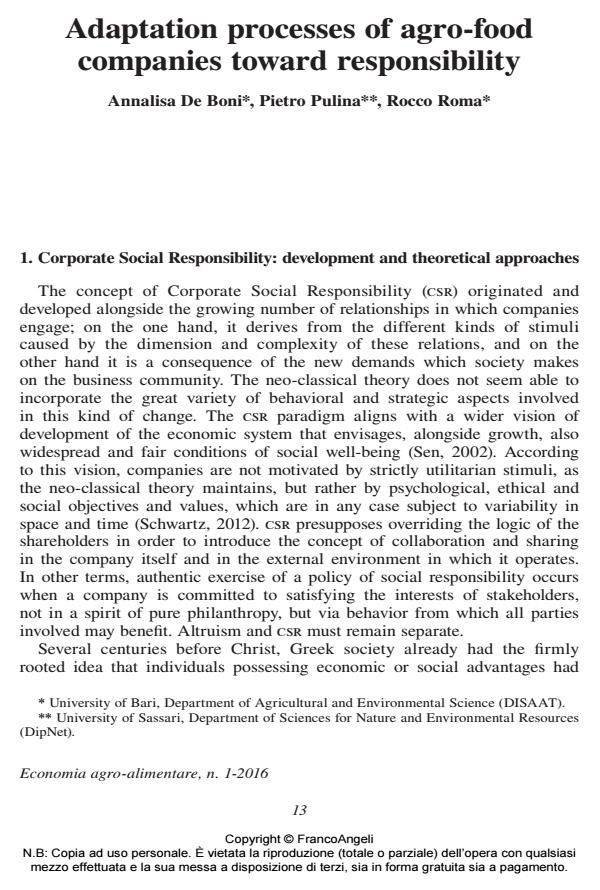Adaptation processes of agro-food companies toward responsibility
Titolo Rivista ECONOMIA AGRO-ALIMENTARE
Autori/Curatori Annalisa De Boni, Pietro Pulina, Rocco Roma
Anno di pubblicazione 2016 Fascicolo 2016/1
Lingua Inglese Numero pagine 26 P. 13-38 Dimensione file 182 KB
DOI 10.3280/ECAG2016-001002
Il DOI è il codice a barre della proprietà intellettuale: per saperne di più
clicca qui
Qui sotto puoi vedere in anteprima la prima pagina di questo articolo.
Se questo articolo ti interessa, lo puoi acquistare (e scaricare in formato pdf) seguendo le facili indicazioni per acquistare il download credit. Acquista Download Credits per scaricare questo Articolo in formato PDF

FrancoAngeli è membro della Publishers International Linking Association, Inc (PILA)associazione indipendente e non profit per facilitare (attraverso i servizi tecnologici implementati da CrossRef.org) l’accesso degli studiosi ai contenuti digitali nelle pubblicazioni professionali e scientifiche
This article presents an overview of the concept of Corporate Social Responsibility (csr), analyzing firstly its development and theoretical approaches. As many authors highlight, csr originated and developed along with the growing number of relationships in which companies engage; on the one hand, csr derives advantages from the different kinds of stimuli arising from the size and complexity of these relationships, but on the other hand, there are new demands that society makes on the business community as a consequence. csr is very important for agrofood companies because of the great degree to which agro-food sector activities depend and impact on the economy, the environment and society. Themes related to csr have featured in EU and national policy for some time, not only in Italy but also in other European and non-EU States. The need to give visibility to their involvement in "social responsibility" has led companies increasingly to adopt charters of values and codes of ethical conduct that legitimize their activities, as well as adhering to the legal framework and ensuring individual morality. This social accounting fulfills the need for transparency, so that companies monitor their own performances and communicate the results to customers, with positive effects on the company image. csr is increasingly important: the reasons lie in the need to create a new system of rules, or to supplement those already existent in production processes involving increasingly numerous and complex relations and widening groups of stakeholders. At the end of the work, two case studies are presented as examples of successful agro-food companies that have put responsible behavior into practice, also involving in this process other companies above and below them in the same production chain.
Parole chiave:Corporate social responsibility, food sector, supply chain multifunctionality
Jel codes:M14, Q18
- 2022 International Conference on Computing, Communication, and Intelligent Systems (ICCCIS) Sheetal Soni, Usha Yadav, pp.930 (DOI:10.1109/ICCCIS56430.2022.10037713)
- Corporate social responsibility reporting: The case of the agri-food sector Valeria Sodanoa, Martin Hingley, in ECONOMIA AGRO-ALIMENTARE 1/2018 pp.93
DOI: 10.3280/ECAG2018-001006 - Spread the word: Certifying sustainable behaviour for territorial development. A stakeholder engagement approach to assess financial performance Francesco Manta, Valeria Stefanelli, Vittorio Boscia, in Corporate Social Responsibility and Environmental Management /2023 pp.1096
DOI: 10.1002/csr.2406
Annalisa De Boni, Pietro Pulina, Rocco Roma, Adaptation processes of agro-food companies toward responsibility in "ECONOMIA AGRO-ALIMENTARE" 1/2016, pp 13-38, DOI: 10.3280/ECAG2016-001002